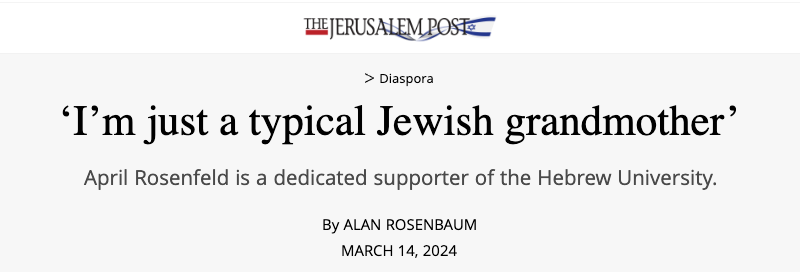
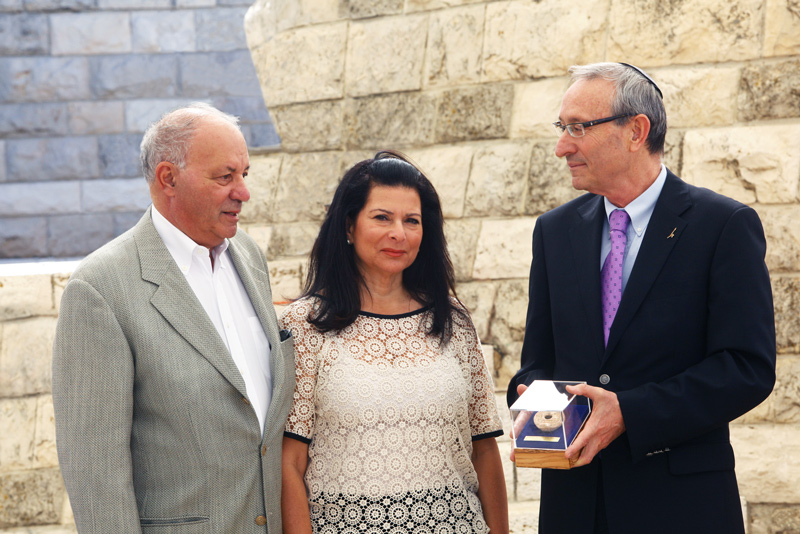
‘I’m not what you would call a typical philanthropist,” says April Rosenfeld. “I’m just a typical Jewish grandmother and mom.”
Quiet, reserved, and self-effacing, Rosenfeld has emerged as a dedicated supporter of the Hebrew University of Jerusalem, both through the Michael and April Rosenfeld Family Endowment for Alzheimer’s Research at the school and the frequent events that she hosts in her Montreal home, which feature speakers from the Hebrew University.
Rosenfeld first became involved with the school together with her husband, Michael, when they established the Michael and April Rosenfeld Family Endowment for Alzheimer’s Research.
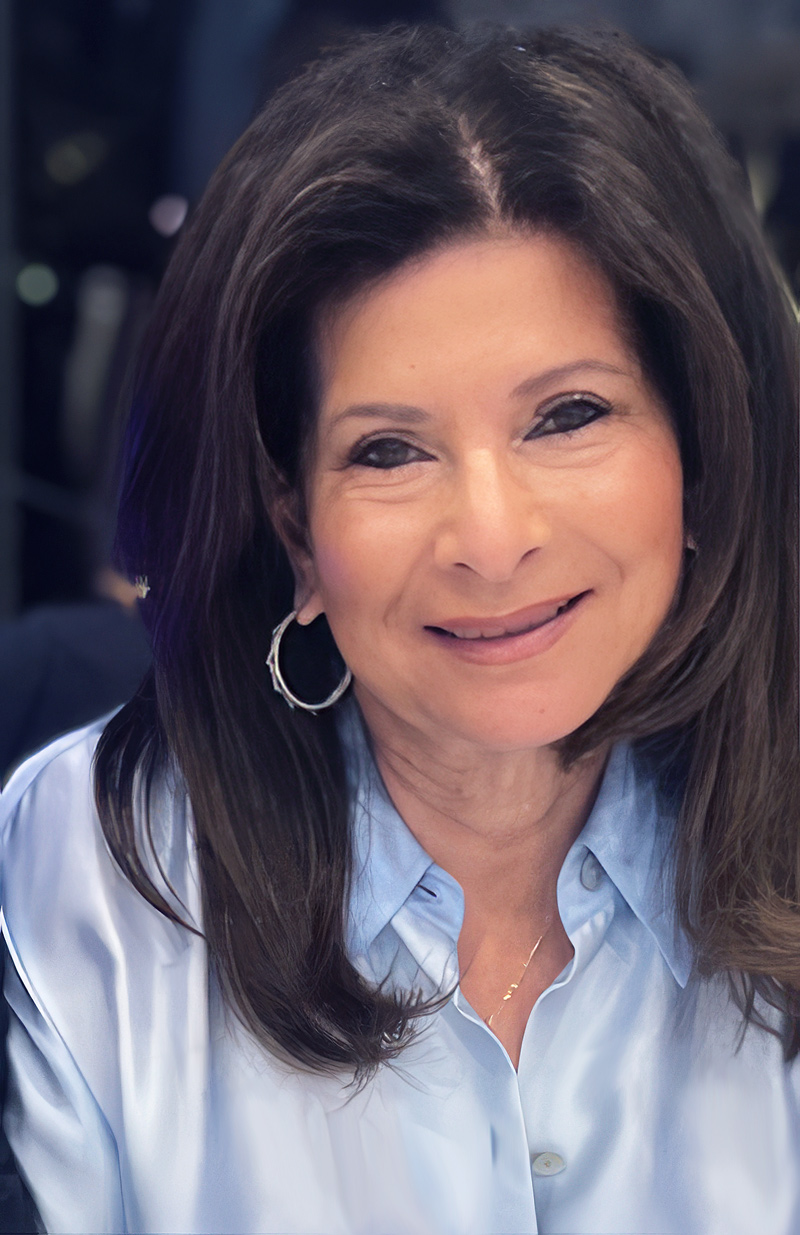
Ironically, after they created the fund, her brother-in-law and her mother both developed Alzheimer’s disease. “In the end, it turned out to be a very personal thing for us,” she notes.
Since the establishment of the foundation, Hebrew University researchers have made substantial progress in Alzheimer’s disease research, particularly for women. After her husband died in early 2019, Rosenfeld decided to increase her involvement with the university.
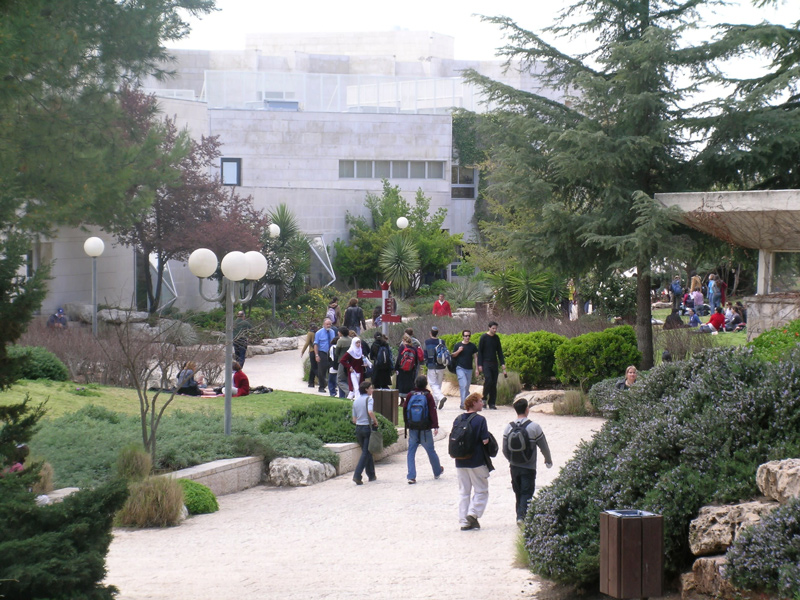
“I couldn’t give a tremendous amount of money, but I could do other things. I decided that I didn’t want to just be a donor. I wanted to be a little more active, host events, and spread the word about Hebrew University.”
When she holds events in her home in Montreal, Rosenfeld resolutely refuses to promote them as fundraising events.
“I don’t tell people to give,” she says. “The donations will come, but I think it is important to spread the word of what Hebrew University is about, which is more important. It’s a wonderful place of learning and healing.”
Despite her reluctance to ask for donations, what would she tell someone who is interested in giving to Hebrew University?
Answers Rosenfeld, “I would tell them to go to Israel, visit the university, and see the labs and the people and see what they do. Because really, it’s inspiring.”
Rosenfeld and her husband attended Jewish schools, came from strong Jewish backgrounds, and shared the Jewish value of giving back to the community. Her husband was the president of the elementary school that his daughter attended, and April worked for a cancer support group for a number of years. “I felt that I was privileged, in many ways, and I think that it’s important to give back.”
While today she is retired, Rosenfeld taught a wide variety of subjects in the Jewish day school system in Montreal for many years, including English, Hebrew, French, and economics. In the course of her teaching career, she taught at the Jewish People’s School, Bialik High School, and Herzliah High School.
“I always wanted to be a teacher, ever since I was a little girl,” says Rosenberg. “That was my dream, and I loved it.”
She frequently meets her former students throughout Montreal, who bring up their pleasant memories of the classes she taught.

Like any expert educator, Rosenfeld researched Hebrew University at the time that she and her husband made their initial donation to the university.
“Even after we became involved in Hebrew University, I researched it, I learned about it, how it evolved, how it was developed, and its entire philosophy, including the role of women in Hebrew University and the way it reaches out across the world,” says Rosenfeld.
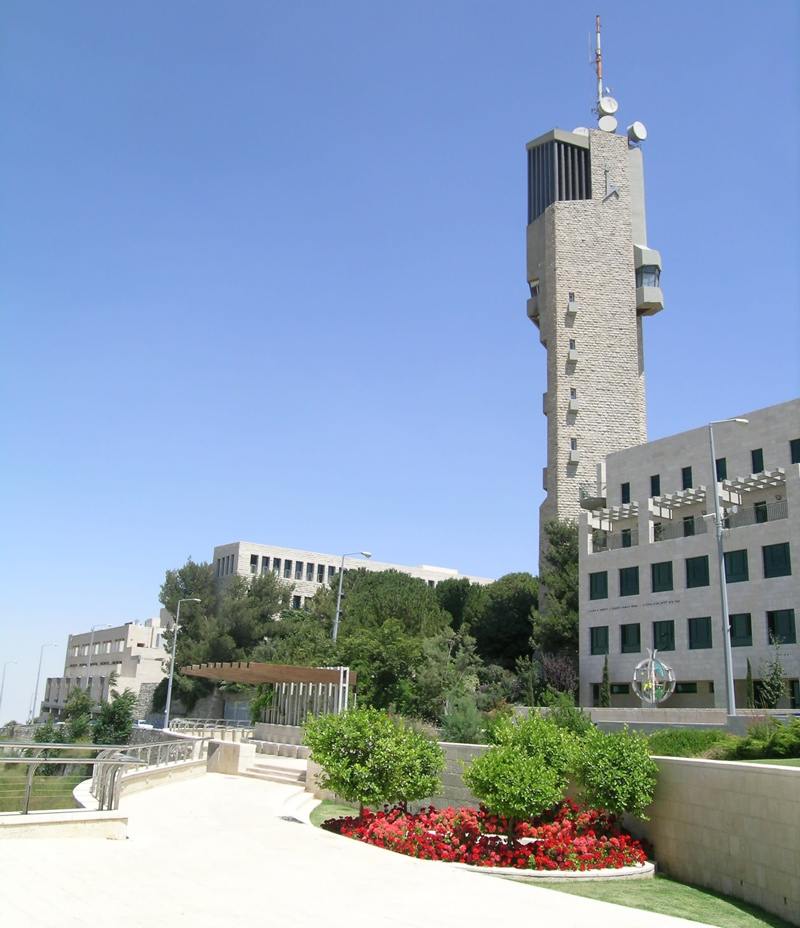
“Hebrew University has connections with universities across Canada – including McGill University and the University of Montreal – and with educational institutions worldwide. It’s a way of showing the world what Israel is, and that’s a wonderful thing. It’s a wonderful place for women to establish themselves and where they can gain recognition. The way that it envelops and brings in everyone – Druze, Arabs, Christians, and Jews – and how everybody can work together and study together and create, make it a wonderful place. It is enriching the world in so many ways.”
Turning to more current events, Rosenfeld says that the close-knit Jewish community in Montreal has come together in support of Israel since the Hamas attacks on Israel’s South on Oct. 7.
“Everybody seemed to just come together in people’s homes, raising a lot of money from such a small community,” she notes.
She says that antisemitic incidents and anti-Israel demonstrations have increased in Montreal and mentions that in November, two Jewish schools in the city were damaged by gunfire, and a Molotov cocktail was thrown through the doors of the Jewish Community Council of Montreal. A number of antisemitic incidents also took place at Concordia University.
Rosenfeld says that while she doesn’t head a major foundation that can give millions of dollars, she is fortunate that she can help out in small ways, and it is meaningful for her to do these things.
“I would love to be able to give $10 million to build a building,” she says. “But I’m creating my own building, in my own way, in terms of building the image of Hebrew University, both in the eyes of people that I know and people I don’t know. Perhaps someone will come to one of my events who will have the $10 million and will be able to donate a building,” she says with a smile.
Rosenfeld notes that everyone who contributes to a valuable cause, whether they can give a large amount or are limited to a small donation, is making a meaningful contribution.
Recalling a childhood memory from the holiday of Tu Bishvat, she says that in her Jewish school, as part of a JNF fundraising project, children would buy leaf-shaped stamps, stick them on a picture of a tree, and bring them to school. “Some children would bring in tree pictures with all of the leaves present. Each leaf cost a few cents, but not everyone could fill an entire tree with the leaves, so we would share a tree. If someone could afford 30 cents for a portion of a tree, another child would pitch in for the other 30 cents. Together, they made an entire tree. We would share in the tree.”
Similarly, she explains, not everyone has the financial resources to make a $50,000 donation. “But if you can give $500, it makes a difference. Because $500 from one person and $150 from another – together, they all add up. It all means something because you give what is your capacity to give and your will to give. It’s important to support Hebrew University and Israel.”
Giving of oneself, or giving to a cause, says Rosenfeld, is important because it helps and benefits the world. Philanthropy, she adds, is not just about giving money. It can also mean giving of one’s soul, one’s time, and one’s thoughts.
“But if you’re giving to a specific place like Hebrew University,” she adds, “it helps the university, and it helps you. It makes you feel good that you’ve done something to help the world, and I think that’s really good. You’ve done something to make this world a better place through tikkun olam – repairing the world. You’re giving to produce something and to create something.”